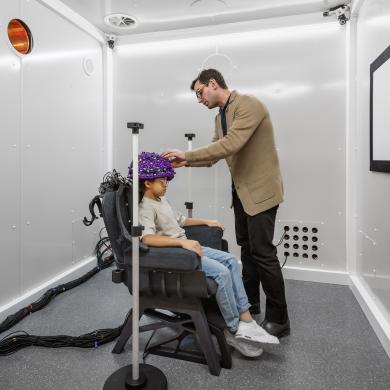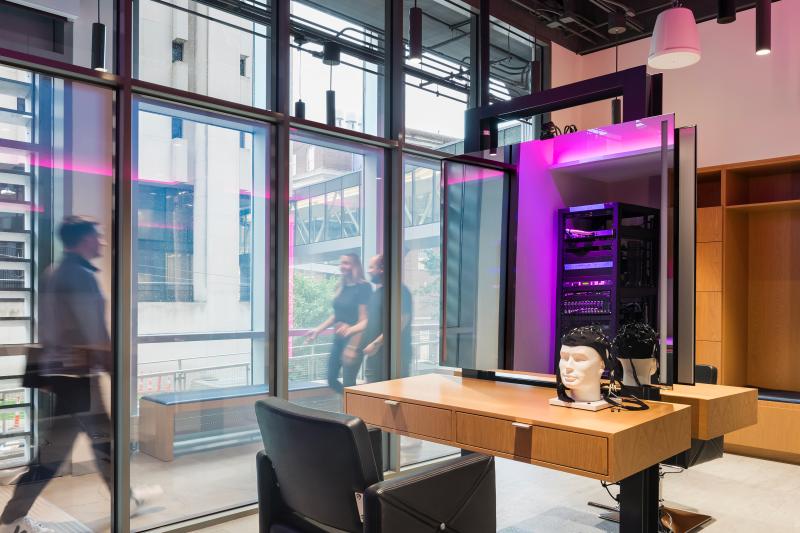
-
About
-
Participate
-
Resources
-
Activities
-
Contact
BrainWorks serves the whole Yale research community, across schools and departments. The facility provides training and access to the most powerful and safe methods for measuring brain activity with unparalleled resolution and for creating immersive experiences to study the brain and behavior in their natural contexts.
Through its equipment, training courses, didactic activities, and public-engagement programs, BrainWorks fosters a community with shared values of promoting discovery science, maximizing scientific excellence, encouraging collaboration, sharing science openly, and engaging with societal issues.
If you are a Yale researcher and would like to learn more or get involved, please visit the BrainWorks pages in Yale's Research Cores Directory.
Research at BrainWorks
Led by the Center for Neurocognition and Behavior, current research at BrainWorks asks some of the most fundamental and interesting questions that go right to the heart of being human. How do we shift back and forth between perceiving the outside world and the contents of our minds? How does stress impact what we learn? Why don’t we remember the rich and formative memories from our first years of life?
Participate in research
To answer these varied and deep questions about the human experience, researchers rely on the voluntary participation of members of the public. BrainWorks welcomes volunteer participants of all ages, from infants to adults. Participating in research is a fun way to gain insight into the workings of your own mind and brain, while helping advance scientific knowledge.
The volunteers at BrainWorks are the most important aspect of our studies. They are greeted in our open and friendly facility by well-informed researchers who are eager to explain and discuss the research and methods, and ready to answer any questions. Participants typically receive monetary compensation for their contributions, and studies generally last no more than a couple of hours.
Join our volunteer database to explore upcoming research opportunities and learn more about participating.



Resources
The breadth and quality of the research tools at BrainWorks are second to none. Below is a list of some of our resources. Researchers can find detailed descriptions and specifications in Yale's Research Cores Directory BrainWorks listing.
Our 3-Tesla Magnetic Resonance Imaging (MRI) scanner uses magnets 60,000 times stronger than the Earth’s magnetic field to image activity in the human brain, as well as its anatomical structure and connections with high spatial resolution. With MRI, researchers can identify which brain areas are engaged and come together during a specific cognitive function. To help new participants acclimatize to the method, a mock scanner is available that simulates the MRI environment.
Our magnetoencephalography (MEG) scanners measure the minute magnetic fields generated by brain cells as they communicate with millisecond resolution. Using MEG, researchers can investigate the dynamics of brain activity with great temporal precision while also preserving good spatial resolution. Two MEG scanners at BrainWorks use different cutting-edge technology to detect the magnetic signals, roughly a billionth in strength compared to the Earth’s magnetic field. A cryogenic MEG scanner uses superconducting technology, while the system with optically pumped magnetometers (OPM) relies on laser technology and was the world's first commercial installation of its kind.
Our human neurophysiology suite contains five electrically shielded labs for measuring and stimulating human brain activity non-invasively. To measure brain activity, researchers can use head-mounted caps for electroencephalography (EEG), to measure the electrical fields generated by neural activity, or for functional near-infrared spectroscopy (fNIRS), to estimate changes in blood parameters related to brain activity. Using transcranial magnetic stimulation (TMS), researchers can inhibit, excite, or modulate neural activity with precise spatial targeting and temporal resolution. Methods in the neurophysiology suite can be combined in flexible ways and used together with eye tracking, robots for controlling motor actions, and other bespoke experimental set-ups.
BrainWorks has exciting immersive labs for studying human cognition in moving agents within more natural settings. The Cave Automatic Virtual Environment (CAVE) provides an ample and fully controllable immersive space for controlling the participants’ multisensory experience while tracking their body, hand, and eye movements without the limitations of head-mounted displays. The movement lab combines an omnidirectional treadmill and virtual reality to support studies while participants walk naturally in any direction within virtual environments. Both immersive labs can be combined with wearable technologies to measure brain activity or physiological body signals.
In addition to brain-related and immersive methods, BrainWorks supports behavioral testing in several ways. Individual behavioral testing rooms are available to conduct cognitive testing, with additional eye tracking if desired; a group behavioral testing room allows testing of six participants simultaneously under well-controlled experimental conditions; and software platforms are provided for recruiting participants for online studies and for developing online testing batteries relying on sensitive and well validated tasks.
Activities
Yale Community
BrainWorks complements access to the high-end scientific equipment with numerous activities to train and bring together its user community. BrainWorks users receive intensive and expert training to enable them to operate the advanced equipment autonomously and safely. Staff offer regular support hours to help users program their tasks and integrate hardware to run successful studies. A digital discussion forum provides an efficient platform for sharing technical challenges and solutions, as well as disseminating updates.
The BrainWorks community comes together in a weekly series to discuss experimental projects in preparation and progress, to learn about new methods through practical demonstrations, and to hear from invited external speakers who are pushing the boundaries of human neuroscience. BrainWorks additionally organizes dedicated bootcamps and intensive training courses to support the dissemination and uptake of new methods.
Subscribe to the BrainWorks listserv for more information about upcoming activities and join the BrainWorks discussion forum to connect with other users.
Engagement
Community engagement with science is a top priority at BrainWorks. Each year, the facility hosts many open-house visits. Additionally, BrainWorks members bring human neuroscience research to the public through collaborations with educational initiatives, such as Yale's Pathways to Science.
If your organization is interested in learning more about human neuroscience research or would like to visit the facility, please contact us.


Collaboration
BrainWorks is open to collaboration. We welcome probing minds, researchers from any discipline wishing to explore connections, industry partners interested in advancing the understanding of human cognition through discovery science, and stakeholders from various sectors curious to understand the relevance and impact of human neuroscience. Funding for research at BrainWorks is provided by generous philanthropy, industry partnerships, and grants from national and internal sources. Please get in touch if you would like to collaborate or support us.
Contact
BrainWorks is located on the first floor of 100 College Street in downtown New Haven.
We ask that visitors park in the 100 College Street Garage which can be accessed via ramps on South Frontage Road or M.L.K. Boulevard.
Parking for participants is available on level two. Once parked, exit the garage using the south elevator to level one. The entrance to BrainWorks is located at the back of 100 College, just across the plaza from the garage. Upon arrival, please ring the doorbell and someone will greet you. We kindly ask that you do not park in the Air Rights Garage.
User-facing information is available at Yale's Research Cores Directory.


















